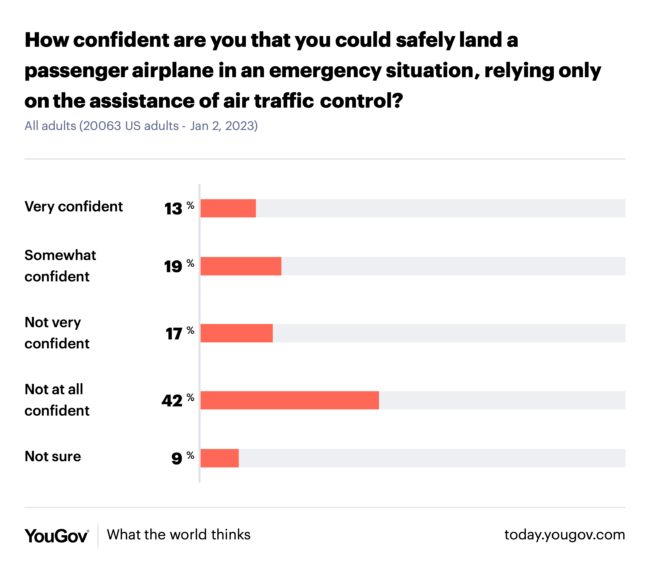
There are of course people out there who do have extensive flying experience, and could indeed give it a go if necessary. Let’s pop them to one side for now, because this is a question for everybody else.
Yes, the question is literally the old Hollywood plot trope – You are on a commercial flight. For some mysterious reason the pilots are incapacitated and the announcement is made, “Do any of you have flying experience, if so would you mind popping on down to the cockpit to help out?“
YouGov recently polled the public and asked the question, “How confident are you that you could safely land a passenger airplane in an emergency situation, relying only on the assistance of air traffic control?“
Here is the breakdown of the answers …

So taking the above, we learn by adding the first two percentages above together that roughly about one third of us are thinking “Yep, not a problem“.
I don’t need to tell you this, but one third of the population do not have that kind of experience or skill. If you are on that aircraft then you are about to die.
Sure there will indeed be people out there who do indeed have sufficient experience and really could manage, but I can guarantee you that one third don’t.
What do the Experts say?
The Washington Post picked up this poll and also took the question to subject matter experts. The answer they got is of course what you might anticipate …
“There is a zero percent chance of someone pulling that off,” said Patrick Smith, a commercial air pilot and founder of the Ask the Pilot blog. “Do people think they can perform transplant surgery? No. Then why do they think they can land a plane?”
Has this scenario ever actually happened on a commercial flight?
Small aircraft, yes several times, but what about a commercial aircraft carrying hundreds of passengers, has this ever actually happened in that context?
Yes, it really has.
It happened on Helios Airways Flight 522 from Larnaca to Prague in 2005.
On the previous flight there was an air pressure leak reported with a door. The engineer working on it set the air pressure system to manual to look into that, then when done, forgot to set it back to auto.
During pre-flight checks the pilots skipped checking the setting and so they did not realise they were about to takeoff with the wrong setting. As the aircraft climbed, the air pressure in the cabin decreased. When they got to about 12,000ft warnings sounded in the cockpit. Unfortunately the pilots interpreted that as a take-off configuration warning because the alarm was exactly the same, so they did not grasp what was happening. At 18,000ft oxygen masks automatically deployed in the passenger cabin.
The Pilot was in radio contact with the ground frantically trying to work the “configuration warning” alarm. An engineer asked, “check that the air-pressure is set to auto“, but it was too late. Due to the lack of Oxygen the pilot and co-pilot had passed out. The aircraft kept ascending and then levelled out at 34,000ft.
Flight attendant Andreas Prodromou using a portable oxygen supply managed to break through the security door and enter the cockpit. He was an experienced pilot and held a UK Commercial Flying License, so he pulled the pilot out and took his seat.
It set the scene for him to be the hero, the right guy in the right place.
Unfortunately his experience was not enough to enable him to gain control of the 737 aircraft. He did manage to bank it away from the city of Athens, but the left engine flamed out due to fuel exhaustion and crashed into hills near Grammatiko in Greece.
Nobody survived, all 121 passengers and crew perished. Cabin Oxygen supply would have only lasted 15 minutes, so they would have all passed out before impact.
The was the deadliest aviation accident in Greek history and resulted in the Cypriot government shutting down Helios Airways permanently.
Details can be found on the Wikipedia page that describes it.
Patrick Smith was indeed correct, the chances of somebody successfully taking over a commercial aircraft and safely landing it, even if they held a commercial flying license is more or less zero.
Why do we believe we can do things that we really can’t do?
Two words – Dunning–Kruger.
The term Dunning–Kruger describes a cognitive bias that humans have.
Let’s clear something up – it is not about stupid people thinking they are smart. Instead this is where we humans, who, when not skilled in a specific task, tend to be overconfident regarding our ability to perform that task.
You can actually measure it like this. A group of people take a quiz. They are then asked to assess how well they did? Their assessment is then measured against how they actually performed.
What is fascinating is that the worse people were at actually doing the quiz the better they thought they did.
Interestingly enough, high performers tended to rate themselves worse than they actually did.
Let me once again repeat that this is not about stupidity. You can have very very smart people also manifesting this. You might indeed be deeply experienced in something and be a subject matter expert in one specific area. That can in turn lead you to be overconfident and so if you stray into an area where you have no experience and no expertise you might not fully grasp how deeply complex it is and end up believing that your skills and knowledge in this other area are far higher than they actually are.
There Can be consequences
Be aware that this is not just about “them”, but rather it is about you and me.
Becoming self-aware of our own limitations can literally be a life saving insight.
Do you still think that you can actually fly a commercial aircraft?
You can test this by sitting in a flight simulator and safely giving it a go. Trust me on this, if you just leap in full of confidence and not really understanding how little you actually know, then during your initial attempts at it you will crash.
Doubt and lack of confidence is often presented as a huge negative. It is in reality also a very powerful motivator that can inspire you to learn and gain the skills you know you lack.
We can be overconfident and end up discovering the hard way how little we actually knew about something. Littered all over Mount Everest are literally hundreds of bodies of highly motivated climbers who all sincerely believed in their own ability.
Be wise, don’t strive to add to their number.
